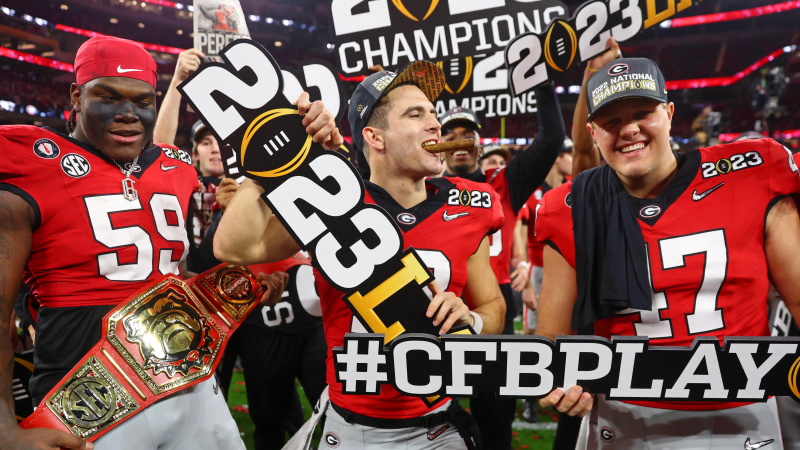Michigan responds to Big Ten notice amid football sign-stealing scandal, per report
The University of Michigan sent a 10-page response to the Big Ten noting a list of reasons why it shouldn't be disciplined for allegations of sign-stealing, according to Yahoo Sports' Dan Wetzel and Ross Dellenger on Wednesday.
Michigan's response also includes alleged evidence of the Wolverines' offensive and defensive signs being stolen by other conference programs, according to the report. The Wolverines are being investigated by the NCAA and Big Ten for potential involvement with unauthorized in-person scouting and reporting of opposing teams' signs by low-level staffer Connor Stalions, who resigned on Friday.
Per multiple reports, sources at 12 of 13 Big Ten schools (other than Michigan) have confirmed Stalions bought tickets to their games. Reports indicate that Big Ten universities have called on first-year commissioner Tony Petitti to take action against the Wolverines (even as reports have emerged that other schools allegedly took similar actions against Michigan).
According to a report by ESPN, any potential punishments by the Big Ten levied toward Michigan wouldn't be expected until Thursday. Here's what you need to know:
Can Big Ten discipline Michigan for sign-stealing allegations?
Michigan could potentially be disciplined for its alleged sign-stealing, according to the Big Ten's sportsmanship policy.
As originally reported by ESPN, Michigan received a notice from the Big Ten notifying it of potential disciplinary action related to the sign-stealing situation on Monday.
Opinion:Big Ten commissioner has nothing but bad options as pressure to punish Michigan mounts
Per the sportsmanship policy, Petitti has executive authority to determine to launch an investigation (or not) and whether to punish a team (or not) if he deems an offense has occurred.
"The Commissioner shall have the exclusive authority to determine whether an offensive action, as contemplated in Agreement 10.01 above, has been committed by anyone referenced in Agreement 10.1 above. In making this determination, the Commissioner may consider any evidence that he or she deems relevant. The Commissioner may accept any information provided by any source, but except as outlined in Agreement 10.3.1 below, has no formal obligation to do so.
"In the event the Commissioner determines that an offensive action has occurred, the Commissioner shall have the authority to impose any disciplinary action in response to the offensive action, subject to the provisions of Agreement 10.3.3.1 below."
The severity of any ensuing punishment would fall into one of two categories: standard and major disciplinary action. Punishments under the former would result in a $10,000 fine to the university and no more than a two-game suspension to involved parties. A major punishment would require approval of the Joint Group Executive Committee.
Michigan response to Big Ten, Tony Petitti
According to Wetzel, Michigan issued a 10-page response to the Big Ten arguing against any punishments toward the football program. The university cited how unadjudicated rule violations cannot result in sportsmanship action, adding that Petitti doesn't have authority to punish Michigan coach Jim Harbaugh under the league's sportsmanship policy.
Another point made in the response notes current disciplinary action would be disproportionate with other teams' sign stealing also coming to light. Michigan also stressed it believes the Big Ten is acting prematurely on the situation, as it says the NCAA hasn't provided it with substantial evidence, according to the report.
Michigan also argues in its response that the NCAA lacks proof of violations by Stalions; to that end, Michigan is unable to appropriately respond to any accusations against it.
Per Dellenger, Michigan also strongly suggested to the Big Ten not to set a precedent for sign-stealing considering it may be "far more prevalent than believed."
Big Ten sportsmanship policy
The Big Ten's sportsmanship policy states:
"The Big Ten Conference expects all contests involving a member institution to be conducted without compromise to any fundamental element of sportsmanship. Such fundamental elements include integrity of the competition, civility toward all, and respect, particularly toward opponents and officials. Accordingly, each member institution, through the actions of the individuals or groups of individuals listed in Agreement 10.1.1 below, has an obligation to behave in a way that does not offend the elements of sportsmanship described above.
"Actions that are offensive to the integrity of the competition, actions that offend civility, and actions of disrespect are subject to review and are punishable in accordance with the terms of this policy. Although this policy will apply most commonly to actions that occur within or around the competitive arena, the scope of its application is intentionally left unrestricted in order to accommodate any behavior, which may occur in any setting, deemed by the Commissioner to offend the underlying objective this policy seeks to achieve."

Disclaimer: The copyright of this article belongs to the original author. Reposting this article is solely for the purpose of information dissemination and does not constitute any investment advice. If there is any infringement, please contact us immediately. We will make corrections or deletions as necessary. Thank you.





